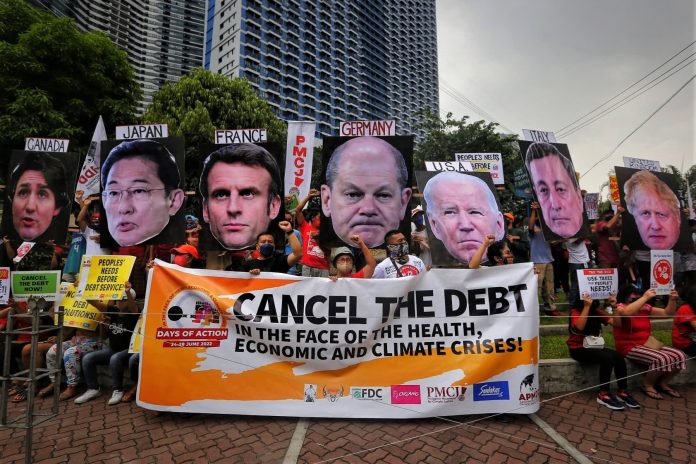“I don’t trust you anymore.”
These were the words uttered by a Global South delegate during a youth event I attended at the recently-concluded Bonn climate conference (SB58). She was not addressing any specific person in the room, but rather the developed countries, or the “Global North”.
This response came during a workshop where the participants discussed the interlinkages between colonialism and the climate crisis. This connection remains largely unrecognized in global policymaking and reports. It took three decades until the IPCC finally recognized colonialism as a driver of the climate crisis, under the Sixth Assessment Report.
Yet the global climate justice movement has brought up this connection for decades. Upon closer examination, we can see how colonialism is not only one of the roots of the climate crisis but has created a legacy that continues to worsen the vulnerabilities of billions of people.
Rotten roots
Elements of colonialism are evident within many indicators of the climate crisis. Look no further than how the climate crisis is usually defined as caused by anthropogenic or human activities. The implication is that humankind as a whole is responsible for polluting the planet when in truth only a handful of countries and corporations are the true culprits. Almost all of them are in the Global North.
At SB58, developed nations continue to make excuse after excuse to not honor their commitment to fund the climate solutions of developing countries, which is even stated in the Paris Agreement. Finance has always been a contentious issue within the global policymaking sphere, but with the urgency of addressing the climate crisis growing with each passing year, the outright refusal of the Global North becomes even more unbearable.
Finance is one of the major disputed issues between developed and developing countries at the Bonn climate summit. The other one is mitigation, on which the disagreements among negotiators were so severe that the agenda was not even adopted until the day before the end of the entire conference.
We must never forget that developed countries caused the climate crisis in the first place. They are largely responsible for greenhouse gases (GHGs) emitted for the past centuries; these historical emissions are the ones triggering the super-typhoons, droughts, sea level rise, wildfires, and other catastrophes we are experiencing and observing around the world.
Why did these emissions occur? Because the Global North pursued its plans for development, fueled by the need for a lot of natural resources, such as crops, minerals, and timber. This culture of consumerism is spreading globally, with the resulting high demands for goods and services leading to large economic productivity and, consequently high GHG emissions.
This is not to mention the loss of biodiversity, degradation of forests and other ecosystems, plastic pollution, dirty air quality, and a myriad of other environmental problems with links to colonialism.
Colonialism is never peaceful, either. Stories of abuse and violence by colonizers is a history shared by the Global South, but elements of colonialism are also evident in many heinous acts we see today. An example of this is how some adaptation and mitigation solutions being proposed may actually be benefitting the pockets of corporations and harming indigenous peoples and other marginalized populations.
Given this historical context, developing countries are unsurprisingly placed at the wrong end of inequity that persists today. Many developing nations, such as the Philippines, are known to be highly vulnerable to extreme climate impacts, despite having little contribution to GHG emissions historically or at present. With developed nations continuing to avoid providing finance and other forms of support owed to developing countries, properly responding to climate impacts, let alone attaining sustainable development, would be virtually impossible.
Recognizing and responding to this form the core of the climate justice movement that can be seen in the Philippines and elsewhere in the world. Billions of people are demanding the Global North, both governments and corporations, to pay for polluting the planet and harming communities, and breaking the world free from the shackles of colonialism.
Yes, it is true that the climate crisis must be averted for the benefit of future generations, but let us not forget the current generation and our shared history. Yes, it is difficult to transition away from fossil fuels, considering how dominant it is in our global energy supply and economic environment.
Yet the fact remains that burning fossil fuels cause and will continue to worsen global climate change. The fact is that it is a necessity, not an option to abandon them as soon as possible for the very survival of our world as we know it. Developed nations must understand that not urgently addressing the climate crisis would ultimately harm them as well, no matter how hard they try to accept their responsibility.
We are interconnected and interdependent on one another. This is part of not just human nature, but nature in its entirety. Integrating this principle in COP decisions, national adaptation, and mitigation programs, at the grassroots level, or in any other scale of climate action is necessary to restore that level of trust that has been broken due to what has happened in the past.
Without trust, there is no effective global action. And without that, the scars of our past born from colonialism would reopen. The wounds of the present would fester.
Make no mistake about it; the burden should never be on developing countries, but on the developed world to prevent the climate crisis from becoming worse. No one has to forget, and no one should.
John Leo is the Deputy Executive Director for Programs and Campaigns of Living Laudato Si’ Philippines and a member of Aksyon Klima Pilipinas and the Youth Advisory Group for Environmental and Climate Justice under the UNDP in Asia and the Pacific. He is a climate and environment journalist since 2016.









